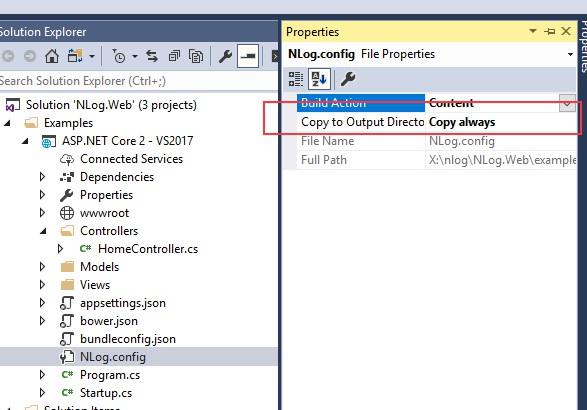ASP.NET Core 中的日志记录 https://docs.microsoft.com/zh-cn/aspnet/core/fundamentals/logging/?view=aspnetcore-2.1 日志级别:Trace -》Debug-》 Information -》Warning-》 Error-》 Critical 级别包含范围由大到小 ,如 T
ASP.NET Core 中的日志记录
https://docs.microsoft.com/zh-cn/aspnet/core/fundamentals/logging/?view=aspnetcore-2.1
日志级别:Trace -》Debug-》 Information -》Warning-》 Error-》 Critical
级别包含范围由大到小 ,如 Trace 就包含了所有信息。
基础用法
public class HomeController : Controller
{
private readonly ILogger _logger;
public HomeController(ILogger<HomeController> logger)
{
_logger = logger;
}
public IActionResult Index()
{
_logger.LogInformation("你访问了首页");
_logger.LogWarning("警告信息");
_logger.LogError("错误信息");
return View();
}
}
日志事件 ID
public class LoggingEvents
{
public const int GenerateItems = 1000;
public const int ListItems = 1001;
public const int GetItem = 1002;
public const int InsertItem = 1003;
public const int UpdateItem = 1004;
public const int DeleteItem = 1005;
public const int GetItemNotFound = 4000;
public const int UpdateItemNotFound = 4001;
}
_logger.LogWarning(LoggingEvents.GetItemNotFound, "GetById({ID}) NOT FOUND", 100);
结果:
warn: TodoApi.Controllers.TodoController[4000]
GetById(100) NOT FOUND
NLog 输出到文件
https://github.com/NLog/NLog.web/wiki
asp.net core 2
https://github.com/NLog/NLog.Web/wiki/Getting-started-with-ASP.NET-Core-2
Create a nlog.config file.
<?xml version="1.0" encoding="utf-8" ?>
<nlog xmlns="http://www.nlog-project.org/schemas/NLog.xsd"
xmlns:xsi="http://www.w3.org/2001/XMLSchema-instance"
autoReload="true"
internalLogLevel="info"
internalLogFile="c:\temp\internal-nlog.txt">
<!-- enable asp.net core layout renderers -->
<extensions>
<add assembly="NLog.Web.AspNetCore"/>
</extensions>
<!-- the targets to write to -->
<targets>
<!-- write logs to file -->
<target xsi:type="File" name="allfile" fileName="c:\temp\nlog-all-${shortdate}.log"
layout="${longdate}|${event-properties:item=EventId_Id}|${uppercase:${level}}|${logger}|${message} ${exception:format=tostring}" />
<!-- another file log, only own logs. Uses some ASP.NET core renderers -->
<target xsi:type="File" name="ownFile-web" fileName="c:\temp\nlog-own-${shortdate}.log"
layout="${longdate}|${event-properties:item=EventId_Id}|${uppercase:${level}}|${logger}|${message} ${exception:format=tostring}|url: ${aspnet-request-url}|action: ${aspnet-mvc-action}" />
</targets>
<!-- rules to map from logger name to target -->
<rules>
<!--All logs, including from Microsoft-->
<logger name="*" minlevel="Trace" writeTo="allfile" />
<!--Skip non-critical Microsoft logs and so log only own logs-->
<logger name="Microsoft.*" maxLevel="Info" final="true" /> <!-- BlackHole without writeTo -->
<logger name="*" minlevel="Trace" writeTo="ownFile-web" />
</rules>
</nlog>
复制到输出目录:始终复制

Update program.cs

这里 nlog-all-.log 是记录所有日志,nlog-own-.log 记录跳过Microsoft 开头的类库输出的相关信息,剩下的信息。
参考:https://www.jb51.net/article/142992.htm
到此这篇关于ASP.NET Core使用NLog输出日志记录的文章就介绍到这了。希望对大家的学习有所帮助,也希望大家多多支持自由互联。
